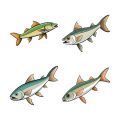Introduction to Bass Fishing in the UK
If you’ve ever strolled along a British beach at sunrise or watched a family casting lines from a rocky outcrop, you’ll know that bass fishing is more than just a pastime here—it’s a cherished tradition. Throughout the UK’s beautiful coastal waters, families and friends gather year-round, drawn by the promise of adventure, fresh sea air, and the thrill of catching the iconic European sea bass. From Cornwall’s rugged cliffs to the sweeping estuaries of Wales and the South Coast, bass fishing is woven into local life, bringing together generations for laughter, learning, and unforgettable memories.
The popularity of bass fishing along our shores owes much to the accessibility of local waters. Whether you’re a seasoned angler or simply looking for a wholesome day out with loved ones, there’s always a welcoming spot to cast your line. Coastal communities often celebrate this shared love through friendly competitions, seasonal events, and even impromptu fish suppers right on the sand. It’s no wonder many consider bass fishing an essential part of growing up by the British seaside—a source of pride and connection as well as fun.
Bass fishing not only fosters strong community ties but also encourages respect for nature and sustainable practices. Many families pass down their favourite fishing spots and tips through generations, ensuring traditions continue while nurturing new enthusiasts. There’s something truly special about feeling that first tug on the line with your children by your side or swapping stories with fellow anglers after a long day by the water.
Rods and Reels: Choosing the Right Setup
When it comes to bass fishing along the beautiful British coastline, selecting the right rod and reel can make all the difference to your day on the water. Whether you’re casting from rugged Cornish rocks or wading in a Sussex estuary, the right setup ensures you can handle lively sea bass and enjoy every moment.
Understanding Rod Length and Action
For UK coastal waters, most anglers prefer rods between 8ft and 10ft. This length offers a good balance of casting distance and control, especially when targeting bass that often patrol the surf or near rocky outcrops. A medium to fast action rod is ideal—it gives you sensitivity for subtle bites but enough backbone to play hard-fighting fish.
Recommended Rod Brands
| Brand | Model | Why Its Popular |
|---|---|---|
| Greys | GR75S Sea Bass Rod | Trusted by local anglers for its strength and casting ability |
| Savage Gear | Bushwhacker Sea Bass | Lightweight and responsive, great for long sessions |
| Shakespeare | Agility Sea Tipster | Affordable yet reliable, perfect for beginners |
Selecting the Right Reel
A fixed spool (spinning) reel is a favourite among UK sea bass anglers due to its ease of use and versatility. When matching a reel to your rod, consider a size between 3000 and 4000—this offers a good line capacity for saltwater conditions without being too bulky for casting all day.
Popular Reel Choices in Britain
| Brand | Model | Main Features |
|---|---|---|
| Daiwa | Ninja LT 4000-C | Smooth drag system, durable build—great for UK saltwater use |
| Penn | Battle III 4000 | Tough construction, excellent for bigger bass near snags or rocks |
| Shimano | Sahara FI 3000XG | User-friendly, lightweight—good for family outings or newcomers |
Tips for Beginners and Experienced Anglers Alike:
- If youre just starting out, look for combo deals from trusted brands—they take the guesswork out of matching rods and reels.
- Seasoned anglers might prefer custom setups, but always check your gear is saltwater-resistant to withstand those bracing British waves.
- No matter your experience level, rinse your tackle with fresh water after each trip to extend its life—a tip passed down through generations of local fishers!
With the right rod and reel tailored to our unique coastal environment, you’ll be well equipped to enjoy memorable days out bass fishing on Britain’s stunning shores.

3. Lines, Lures, and Hooks: What Works Best Locally
When it comes to bass fishing along the British coast, choosing the right line, lure, and hook makes all the difference between a day of casting practice and landing that prize sea bass. Local anglers often have their favourites, so here’s a friendly look at what tends to work best in our waters.
Lines: Balancing Strength and Stealth
British bass are known for their spirited fights, so your main line needs to be strong yet subtle enough not to spook them in clearer waters. Braid is widely favoured for its sensitivity and casting distance, especially when targeting rocky marks or fishing from piers. Monofilament, on the other hand, remains a popular choice for its stretch and forgiveness—perfect for those learning the ropes or fishing over sandy bottoms. Here’s a quick comparison:
| Line Type | Recommended Strength | Best For |
|---|---|---|
| Braided Line | 20–30lb | Rocky ground, longer casts, experienced anglers |
| Monofilament | 12–18lb | Sandy beaches, beginners, shock absorption |
Lures: Tried-and-Tested Local Favourites
The British coast has its classics when it comes to lures. Hard-bodied plugs like the classic Rapala X-Rap or Megabass Zonk are perennial favourites for working along shallow reefs and rougher ground. Soft plastics such as Savage Gear Sandeel or Fiiish Black Minnow are incredibly effective when worked slowly over sandbanks or in estuaries—mimicking the baitfish local bass love to chase.
Top Lure Types by Location
| Lure Type | Recommended Spots |
|---|---|
| Hard Plugs (Floating/Sinking) | Reefs, rocky outcrops, surf beaches |
| Soft Plastics (Shads/Sandeels) | Estuaries, sandbanks, harbours |
Hooks: Reliable Choices for British Bass
You’ll want hooks that can handle powerful runs without bending out. Most local anglers opt for size 1/0 to 3/0 strong wire hooks—big enough for decent bait presentation but still subtle enough not to deter wary fish. Circle hooks are gaining popularity due to their higher hookup rates and better catch-and-release outcomes. Don’t forget a few spare trebles if you’re using plugs—bass are notorious for shaking them loose!
A Handy Hook Guide
| Hook Size/Type | Main Use |
|---|---|
| 1/0 – 3/0 J Hooks | Bait fishing with ragworm, mackerel strips |
| Circular Hooks (2/0 – 4/0) | Catching and releasing bass safely |
| Trebles (Size 4 – 6) | Lure replacements on plugs and hard baits |
The right combination of lines, lures, and hooks—tailored to British conditions—will set you up for success. It’s always worth chatting with fellow local anglers on the beach or in your favourite tackle shop; you’ll soon discover which gear is getting bites this season.
4. Clothing and Weather-Proofing: British Coastal Essentials
When it comes to bass fishing along the British coast, staying warm, dry, and comfortable is just as important as the right tackle. The weather can turn in a heartbeat—sunny one moment, drizzly or blustery the next—so preparing for all conditions ensures everyone from grandparents to little ones enjoys the day out by the sea.
Layering Up for Comfort
The key to dressing for the unpredictable British seaside is layering. Start with a moisture-wicking base layer to keep sweat at bay, add an insulating mid-layer for warmth, and finish with a waterproof outer shell to block wind and rain. This way, you can peel off or add layers as needed throughout the day.
Coastal Clothing Checklist
| Item | Purpose | Family-Friendly Tip |
|---|---|---|
| Waterproof Jacket & Trousers | Keeps you dry during sudden showers or sea spray | Choose bright colours for kids for easy spotting on busy beaches |
| Wellies (Wellington Boots) | Essential for wet sand, rock pools, and puddles | Invest in insulated wellies for colder days |
| Thermal Base Layers | Retain body heat during chilly mornings or evenings | Select soft, non-itchy fabrics for little ones’ sensitive skin |
| Windproof Hats & Gloves | Protect extremities from brisk coastal breezes | Mittens work well for children prone to losing gloves! |
Packing Smart: Extra Bits & Bobs
- Packed ponchos for surprise downpours—lightweight and easy to stash in a rucksack.
- Sunscreen and sunglasses are still musts even on cloudy days; those UV rays can be sneaky along reflective waters.
- Spare socks and a towel—there’s nothing like dry feet after an accidental paddle.
A Little Family Wisdom
Before heading out, check the local forecast and tide times. Pop an extra jumper and flask of tea in your kit bag; it’s these little comforts that keep spirits high when the clouds roll in. With everyone bundled up and weather-proofed, your family fishing adventure along Britain’s beautiful coastlines is set to be memorable—for all the right reasons!
5. Local Regulations and Responsible Angling
As we enjoy the thrill of bass fishing along Britain’s stunning coastline, it’s essential to stay mindful of local regulations and to fish responsibly. The UK has specific rules designed not just to protect sea bass populations, but also to ensure that generations to come can share in this rewarding pastime. Let’s take a gentle moment to review what you need to know before heading out.
Bass Fishing Rules in the UK
Before casting your line, it’s important to be aware of the legal requirements for bass fishing. While you don’t need a rod licence for sea fishing from the shore or on the open sea in England, Wales, or Northern Ireland, there are crucial seasonal restrictions and size limits that every angler must follow.
Key Regulations at a Glance
| Regulation | Detail |
|---|---|
| Open Season (Recreational) | Generally 1st April – 31st October (Check local byelaws) |
| Bag Limit | Up to 2 bass per angler per day (when permitted) |
| Minimum Landing Size | 42cm (from tip of snout to end of tail fin) |
| No Take Zones | Certain estuaries & nursery areas (see Environment Agency guidance) |
Conservation: Our Shared Responsibility
Caring for our coastal waters means thinking beyond today’s catch. Practising catch and release, using barbless hooks, and handling fish with wet hands or a soft cloth help minimise harm. If you do keep a bass, always measure carefully and only take what you’ll eat—leaving smaller fish ensures they can grow and breed for future seasons.
Why Responsible Angling Matters
Bass stocks have faced real challenges in recent years, so every small action helps. Respecting bag limits and size restrictions is not just about following the law—it’s about being part of a wider community effort to preserve our marine heritage. By sharing these good habits with young anglers in your family, you’re helping protect this special experience for years to come.
6. Handy Extras to Pack For Your Day Out
While having the right rods, reels, and lures is crucial for bass fishing along the British coast, there are a few extra bits and bobs that can make your adventure not only more successful but also much more enjoyable. Let’s face it—there’s something wonderfully British about being prepared for every eventuality, especially when the weather can be a tad unpredictable!
Creature Comforts for the Coast
A well-packed flask of strong tea can be a true lifesaver when those coastal winds pick up or a drizzle rolls in. Pop in a couple of mugs and you’ll have a warming treat to share during those quiet moments between bites. It’s not just tea—some anglers swear by bringing along a hearty sandwich or two, maybe even a pork pie or a packet of digestives, to keep your energy up during long sessions on the shore.
Sturdy Storage Solutions
Don’t forget a reliable tackle box to keep your gear organised and protected from salty spray. Choose one with plenty of compartments so you’re never rummaging around for that elusive spare hook or swivel. A comfortable rucksack is also handy for carrying your lunch, drinks, and any extra clothing layers you might need.
Recommended Extras to Pack
| Item | Why Bring It? |
|---|---|
| Flask of Tea | Stay warm and refreshed all day |
| Hearty Snacks | Keep your energy up during long sessions |
| Tackle Box | Organise and protect your gear |
| Waterproof Jacket | Be ready for sudden showers |
| Folding Chair | Add comfort to your fishing spot |
A Little Bit of Home Comfort Goes Far
Packing these thoughtful extras isn’t just about convenience—it’s about making your day out feel special and stress-free. Sharing a cuppa or some homemade treats with family or friends as you wait for that perfect bite brings everyone together and creates memories you’ll cherish long after the tide has gone out. So next time you head off for some bass fishing on the British coast, remember: it’s often the little things that make the biggest difference.


